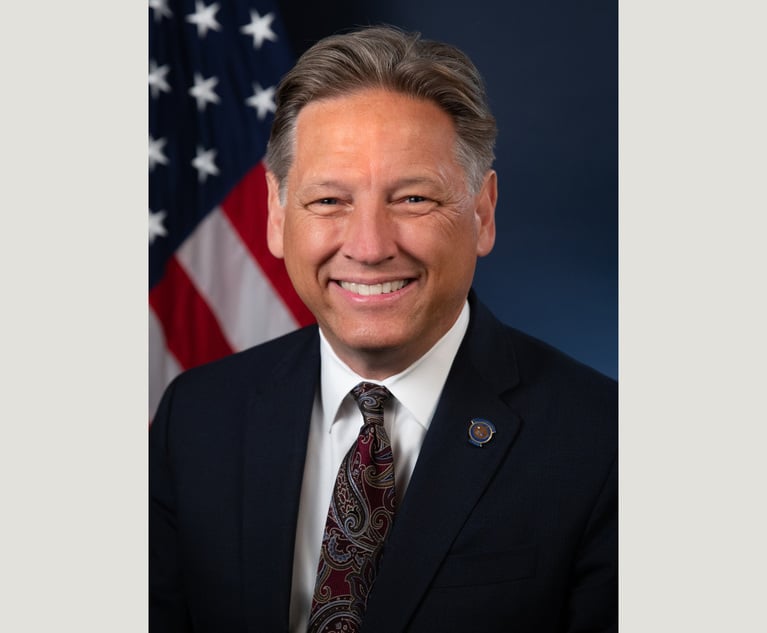Q&A: Former DOJ Attorney Dissects AG Sessions' Marijuana Memo
John W. Vardaman III says Sessions' rescission of Obama-era guidance on marijuana puts U.S. attorneys "in a very tenuous position."
January 04, 2018 at 05:51 PM
6 minute read
 John W. Vardaman III, general counsel of Hypur Inc.
John W. Vardaman III, general counsel of Hypur Inc.
When U.S. Attorney General Jeff Sessions on Thursday rescinded Obama-era policies shielding marijuana-legalized states, John W. Vardaman III said he wasn't exactly surprised. The former Department of Justice attorney and current Hypur general counsel had, like everyone else, heard and read Sessions' criticisms of cannabis use and states that have chosen to allow it.
What did stun Vardaman was the vague and short nature of the memo. In three paragraphs and a footnote, Sessions axed five DOJ guidance documents on marijuana and simply urged prosecutors to “follow the well-established principles that govern all federal prosecutions.” Among the discarded documents is the original 2013 Cole memo. Written by then-Deputy Attorney General James Cole, the memo details steps states with legalized marijuana can take, such as keeping the drug away from kids, to avoid a federal crackdown.
“I just don't think it's as simple as saying that memo that was issued four years ago is rescinded and we now go back to the way things were,” said Vardaman, who helped write a now-rescinded 2014 DOJ memo advising financial institutions serving marijuana clients.
“This is not the same situation we were in when the original Cole memo was issued,” he said. “There are many more states that have done it. There's much more legal infrastructure. There are many more jobs. There's much more money. There's much more tax revenue.”
Vardaman spoke with The Recorder Thursday about what Sessions' actions mean for states such as California, which just launched a recreational marijuana market on Monday. The interview has been edited for length and clarity.
Q: When a memo like this is issued, are there discussions with U.S. attorneys about its enforcement? What's happening behind the scenes?
A: I can only speculate. I have no idea how much groundwork was laid in advance of this. I don't know if the White House was involved. I don't know if they reached out to every U.S. attorney's office and told them this was coming. Usually, if something like that is about to happen, you get some kind of indication. But there were no advanced warnings, at least that I heard, that this was coming.
It puts U.S. attorney's offices in states where marijuana has been legalized in a very tenuous position. On one hand, the views of this attorney general are very clear in terms of his hostility to marijuana. U.S. attorneys are usually not apt to act contrary to the wishes of the attorney general. On the other hand, it says the U.S. attorneys retain discretion to enforce laws as they see fit depending upon a variety of factors, including prioritization and resources.
So if the U.S. attorney in Colorado says I don't have the resources to go after this industry, with no help from state and locals, even if you wanted to, where would you start? Do you just start mass arrests and raids of every legalized marijuana shop?
It also may be that this was just a way of trying to force Congress to stand up and to do something and to say, listen, if you really want legalized marijuana, the best way to do that is through a change in the law.
Q: What about this memo's potential to affect access to banking for those in the industry and those serving the industry?
A: It's going to have a chilling effect on an area that was already pretty chilly to begin with. Banks hate uncertainty and what this has done has just injected more uncertainty into marijuana legalization generally and marijuana banking specifically. It certainly doesn't help, that's for sure.
Q: Does the Rohrabacher-Blumenauer amendment [set to expire later this month] offer any protections?
A: This definitely raises the stakes on the import of that amendment. Without it there are literally no legal protections for state-legalized marijuana. Even with it, it's not a full safe harbor but it's at least something. I think you're going to start seeing a lot of attention on that and you might start seeing more serious efforts at more sweeping legalization or state harbor efforts in Congress as a result of this.
Q: Is there anything that regulators in states such as California can do to protect their industries?
A: Other than making sure that the state marijuana market is run as transparently and compliantly as possible, that's always been my advice under the Cole memo. Now with it gone, even the most compliant state marijuana regime arguably doesn't have any legal protection anymore.
At the end of the day, there's nothing they can do because it's really up to the feds and the U.S. attorneys in California. If they decide for whatever reason that marijuana enforcement is a priority, you can't rely upon state law in the face of a conflicting federal law. So there's really not a lot they can do.
At a minimum they should make sure that the market in their state is being run as compliantly as possible. If nothing else, if you have a state where the market is being run in an irresponsible, noncompliant, nontransparent way, then if there really is going to be enforcement, then obviously you're going to have a real bull's-eye on your back.
Q: Do you feel confident at all in making predictions on where this is all going in, say, six months?
A: Guessing anything in the short term would be difficult. Again, I don't know what's been done in anticipation of this. I don't know if there's an understanding of what this really means is, OK U.S. attorneys, go back and really enforce the law and resources be damned. I don't know if the understanding is just the opposite, that this attorney general wants to issue something that makes clear his opposition to this, that it's being done with the understanding that the train has left the station, you can't legitimately go after every single individual and entity that's involved in state legalized marijuana, and so nothing is going to change.
In some ways short-term bad news could be long-term good news in that if there really is a crackdown because of this, that could really spur efforts at the federal level or within Congress to afford some legal protection.
This content has been archived. It is available through our partners, LexisNexis® and Bloomberg Law.
To view this content, please continue to their sites.
Not a Lexis Subscriber?
Subscribe Now
Not a Bloomberg Law Subscriber?
Subscribe Now
NOT FOR REPRINT
© 2025 ALM Global, LLC, All Rights Reserved. Request academic re-use from www.copyright.com. All other uses, submit a request to [email protected]. For more information visit Asset & Logo Licensing.
You Might Like
View All
Invoking Trump, AG Bonta Reminds Lawyers of Duties to Noncitizens in Plea Dealing
4 minute read
California Supreme Court Vacates Murder Conviction in Infant Abuse Case
5 minute readTrending Stories
- 1No Two Wildfires Alike: Lawyers Take Different Legal Strategies in California
- 2Poop-Themed Dog Toy OK as Parody, but Still Tarnished Jack Daniel’s Brand, Court Says
- 3Meet the New President of NY's Association of Trial Court Jurists
- 4Lawyers' Phones Are Ringing: What Should Employers Do If ICE Raids Their Business?
- 5Freshfields Hires Ex-SEC Corporate Finance Director in Silicon Valley
Who Got The Work
J. Brugh Lower of Gibbons has entered an appearance for industrial equipment supplier Devco Corporation in a pending trademark infringement lawsuit. The suit, accusing the defendant of selling knock-off Graco products, was filed Dec. 18 in New Jersey District Court by Rivkin Radler on behalf of Graco Inc. and Graco Minnesota. The case, assigned to U.S. District Judge Zahid N. Quraishi, is 3:24-cv-11294, Graco Inc. et al v. Devco Corporation.
Who Got The Work
Rebecca Maller-Stein and Kent A. Yalowitz of Arnold & Porter Kaye Scholer have entered their appearances for Hanaco Venture Capital and its executives, Lior Prosor and David Frankel, in a pending securities lawsuit. The action, filed on Dec. 24 in New York Southern District Court by Zell, Aron & Co. on behalf of Goldeneye Advisors, accuses the defendants of negligently and fraudulently managing the plaintiff's $1 million investment. The case, assigned to U.S. District Judge Vernon S. Broderick, is 1:24-cv-09918, Goldeneye Advisors, LLC v. Hanaco Venture Capital, Ltd. et al.
Who Got The Work
Attorneys from A&O Shearman has stepped in as defense counsel for Toronto-Dominion Bank and other defendants in a pending securities class action. The suit, filed Dec. 11 in New York Southern District Court by Bleichmar Fonti & Auld, accuses the defendants of concealing the bank's 'pervasive' deficiencies in regards to its compliance with the Bank Secrecy Act and the quality of its anti-money laundering controls. The case, assigned to U.S. District Judge Arun Subramanian, is 1:24-cv-09445, Gonzalez v. The Toronto-Dominion Bank et al.
Who Got The Work
Crown Castle International, a Pennsylvania company providing shared communications infrastructure, has turned to Luke D. Wolf of Gordon Rees Scully Mansukhani to fend off a pending breach-of-contract lawsuit. The court action, filed Nov. 25 in Michigan Eastern District Court by Hooper Hathaway PC on behalf of The Town Residences LLC, accuses Crown Castle of failing to transfer approximately $30,000 in utility payments from T-Mobile in breach of a roof-top lease and assignment agreement. The case, assigned to U.S. District Judge Susan K. Declercq, is 2:24-cv-13131, The Town Residences LLC v. T-Mobile US, Inc. et al.
Who Got The Work
Wilfred P. Coronato and Daniel M. Schwartz of McCarter & English have stepped in as defense counsel to Electrolux Home Products Inc. in a pending product liability lawsuit. The court action, filed Nov. 26 in New York Eastern District Court by Poulos Lopiccolo PC and Nagel Rice LLP on behalf of David Stern, alleges that the defendant's refrigerators’ drawers and shelving repeatedly break and fall apart within months after purchase. The case, assigned to U.S. District Judge Joan M. Azrack, is 2:24-cv-08204, Stern v. Electrolux Home Products, Inc.
Featured Firms
Law Offices of Gary Martin Hays & Associates, P.C.
(470) 294-1674
Law Offices of Mark E. Salomone
(857) 444-6468
Smith & Hassler
(713) 739-1250








